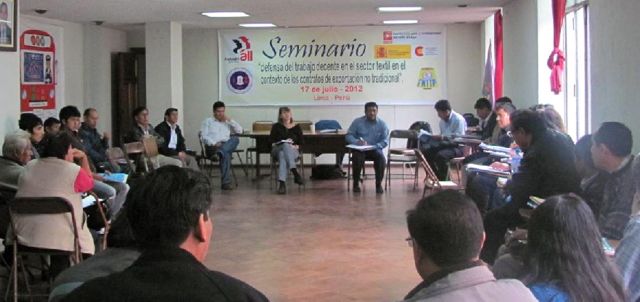20 July, 2012Two Peruvian textile workers’ federations are launching an ‘adopt a Congress person’ campaign as part of their efforts to end a law which has condemned workers to a lifetime of short-term contracts in appalling working conditions.
Last year the FNTTP, an affiliate of IndustriALL Global Union, managed to introduce in Congress a bill to repeal the labour provisions of the law on ‘non-traditional exports’. However, vested interests have prevented the bill from coming to a vote.
With Congress currently in recess, leaders from over twenty workplace unions from different parts of the country came together in Lima on 17 July to regroup and plan for the next phase of their campaign.
In a workshop organized by IndustriALL Global Union with support of the Fundación Paz y Solidaridad of the Spanish CC.OO., participants adopted proposals for an ‘adopt a Congress person’ campaign aimed at seeking grassroots involvement in lobbying lawmakers.
As part of the campaign, workplace unions will be asked to send letters and collect signatures on a petition. The campaign will escalate in the coming period to ensure the voice of workers is heard loud and clear at key points in the campaign.
Explains Gerardo Olortegui, defense secretary of IndustriALL affiliate FNTTP: “The halls of Congress are lined with lawyers on the industry payroll who attend every hearing and who regularly wine and dine with politicians. Our Federation, on the other hand, has very limited resources, so we have to make the most of our most precious asset: the commitment of our members”.
“Workers are desperate for change,” says Olortegui. “We need to make lawmakers aware of the impact the law is having on workers and to ask them to support our position.”
The law on ‘non traditional exports’, which was introduced three decades ago as a temporary measure to assist fledgling companies in an irregular industry, today protects the interests of some of the largest and most profitable companies in the country. As a result, workers are denied the right to organize and bargain collectively, and wages in the sector are among the lowest in the country, with some garment workers being forced to work twelve hours a day for a wage that covers less than half of workers’ basic needs.
